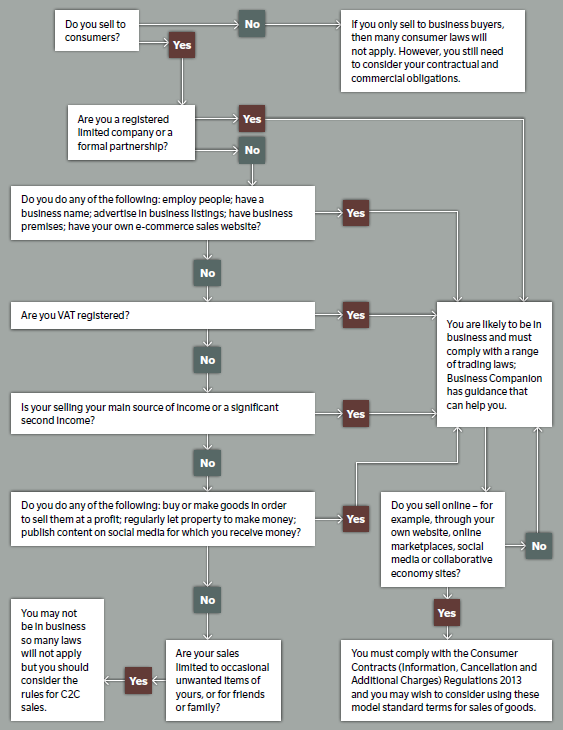In this section
Defining 'in business'
It is difficult to pin down in clear black-and-white terms what being 'in business' means, so the law has broad descriptive definitions.
For example, regulation 2 of the Consumer Protection from Unfair Trading Regulations 2008 states that "'business' includes a trade, craft or profession" and that "'trader' means any person who in relation to a commercial practice is acting for purposes relating to his business".
These general definitions allow the concept of being 'in business' to be wide-ranging and they reflect the expansive nature of what being in business can involve. The definitions clearly apply to registered limited companies, partnerships and individuals who use a business name and employ others in their business. But many other sellers are also acting in law as a business, including some who sell through online platforms, but may not realise their status and the obligations that go with it.
Another key word in much of the legislation is 'trader'. This may conjure up images of market traders selling fruit and vegetables, or City traders in the stock exchange, but in consumer law it goes much further than that: it is an all-encompassing term for any business seller.
Flowchart

FAQs
These frequently asked questions illustrate some examples of assessing whether a seller is 'in business' (also known as being a 'trader'); they are taken from the real experiences of sellers.
Q. I have a job and only sell at weekends, are my activities private sales?
A. It depends. Being in employment - or indeed having any other main source of income - does not preclude you from also being in business in relation to sales. It will depend on the quantity, regularity and nature of the sales. Unfortunately, there are no set financial thresholds or similar black-and-white assessments; each case must be judged individually.
Q. Do I need to be VAT-registered before consumer laws apply to me?
A. No. Being VAT-registered is likely to be a clear indicator of being in business, but many sellers who fall short of the threshold for VAT registration are still business sellers in consumer law.
Q. I occasionally sell off a few items for relatives who can't use a computer. Are these C2C sales?
A. If the activities are restricted to those described, then these are not likely to be business sales. If that is the case, the main requirements are that goods are not misdescribed and the seller has the legal right to sell them. However, if 'a few items' increases and you end up regularly selling a significant number of items, you could be seen as being in business.
Q. I don't have my own website, I just sell on eBay and Facebook, maybe three or four items a day. These platforms are for private sellers, aren't they?
A. These platforms - and others like them - are used effectively by private sellers to get rid of unwanted items and recoup a little money. But the activity in this example sounds like it goes beyond that; the seller would be considered a 'trader' and consumer laws would apply.
Q. I sell bits and pieces at car boot sales. Do I have to comply with consumer laws?
A. Again, regularity and quantity must be assessed, but many sellers at car boot sales are not deemed to be in business.
Q. I sell at car boot sales, through Gumtree and the local small ads; I'm also on a number of Facebook selling groups and I've started using Instagram to sell a few things. Do consumer laws apply to me?
A. In the eyes of the law, hobbies can turn into businesses and scale again is a central factor. Another key point here might be where were the goods obtained and why? Were they recycled or even bought in order to be sold at a profit? It is much more likely that this seller is in business than one who simply attends a few car boot sales.
Q. I run a small community group that makes and supplies soft toys to local children. We don't sell anything so can we ignore consumer laws?
A. Many of the laws relating to consumer sales - such as many addressed by the online contract provisions in part 3 - are not relevant. But others are likely to be very important, in particular product safety legislation, which generally applies to 'supply' and not just sale. Requirements around toys are very strict and specialist advice is needed.
Q. I've read your guide and still can't work out if I'm in business or not. What should I do?
A. Contact your local authority Trading Standards service for advice. Simply enter your postcode into this online search tool for contact details.
